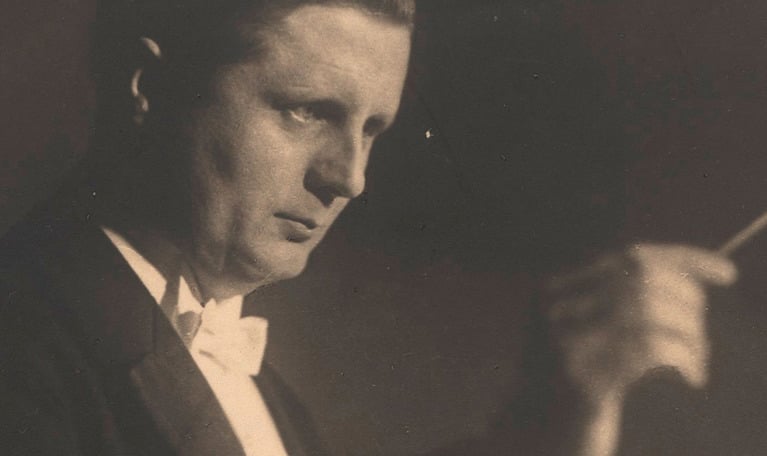Fritz Busch

Fritz Busch was chief conductor from 1937–40. He conducted a total of 101 concerts with the orchestra.
When Václav Talich was forced to relinquish his position with the Stockholm Concert Society due to his health, the orchestra was led in 1936–37 by a series of guest conductors.
They included the frequently appearing Ernest Ansermet and Adolf Wiklund, Fritz Reiner, and the return of the great Arturo Toscanini. Other guest conductors included Sir Thomas Beecham, Hans Knappertsbusch, Eugene Ormandy, Bruno Walter and more – a true list of celebrities, and audience numbers were up to levels as high as those in 1918.
In the summer of 1937, the orchestra performed two concerts at the World’s Fair in Paris – the first guest performance outside of the Nordic region, and the second guest performance abroad since Oslo in 1917. In Paris, the orchestra was led by Nils Grevillius and soloists included Jussi Björling, Joel Berglund and Sven Brandel.
German conductor Fritz Busch (1890–1951) was chief conductor for only a brief period in Stockholm, which was primarily due to World War II.
Fritz Busch was from a musical family (famous violinist Adolf Busch and cellist Hermann Busch were his brothers) and he had studied in Cologne – conducting for Fritz Steinbach – and subsequently worked as a conductor in Riga and as a touring pianist.
He then served as director of the Stuttgart Opera and became famous for his desire to expand the repertoire and introduce contemporary composers such as Paul Hindemith and Hans Pfitzner.
Thus followed a long period as director of the Dresden State Opera, beginning in 1922. Eleven years later, and already five weeks after Adolf Hitler’s takeover in 1933, Fritz Busch was dismissed from his position in Dresden. “For political reasons”, they said, and though he was not Jewish himself, he spent time in Jewish circles, which, together with an elevated and well-paid position, caught the eyes of the Nazis. In addition, his brother was married to a Jewish woman.
Fritz Busch left Germany and before he went to Stockholm, he toured South America and more. He was appointed music director of the English Glyndebourne Festival Opera in 1934, where he remained until the war broke out in 1939 and during that time, he had also begun his period with the Stockholm Concert Society.
While serving as chief conductor in Stockholm, he conducted an average of about 25 concerts per season; in his role as second conductor, Adolf Wiklund conducted around half as many. Wiklund was also a frequent presence with school concerts.
Audience numbers reached peak levels, and it appears as if the season’s 70 concerts were nearly sold out every time, with a total audience of over 120,000. Notable guest conductors in 1938–39 once again include names such as Bruno Walter and Ernest Ansermet, along with Herbert von Karajan, Sir Adrian Boult and Leopold Stokowski.
The outbreak of war resulted in Fritz Busch fleeing once more to the Americas, where he worked at Teatro Colón in Buenos Aires and the Metropolitan in New York.
